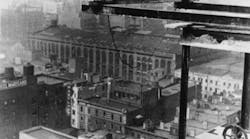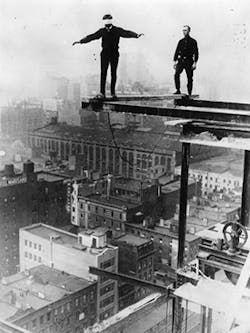Old timers used to call it “dancing on the steel.” It was the dangerous and celebrated practice of walking along steel girders – high above construction sites – without wearing fall protection. Many men lost their lives doing it. Add one more worker fatality to the list.
A 22-year-old apprentice ironworker fell more than 30 feet to his death on July 25, 2014 while standing on a 9-inch-wide steel girder on a building under construction in Kansas City. On the job for just a few weeks, the worker’s employer, Fastrack Erectors Inc., did not provide him with fall protection, according to OSHA.
Following an investigation into the fatality, OSHA cited the structural steel company for seven willful and three serious safety violations and placed the company in the Severe Violator Enforcement Program. Fastrack Erectors employs 40 workers, who specialize in structural steel, miscellaneous steel, pre-engineered metal buildings, ornamental metal handrails and precast installation. The company employs union ironworkers from local union halls. Ironworkers Local 10 in Kansas City represented the 16 employees at the site.
“This young man had his whole life ahead of him. His dreams of marriage, children and exploring the great outdoors were cut short because his employer failed to provide fall protection, a violation of its own safety manual and OSHA rules,” said Marcia Drumm, OSHA’s regional administrator. “This tragedy illustrates how quickly a worker can die when fall protection is not provided, and why it's so important.”
In fact, fatal falls, slips or trips took the lives of 699 workers in 2013. Falls remain the leading cause of death in the construction industry.
OSHA’s inspection found that Fastrack Erectors violated its own safety manual and a signed contract with the site’s general contractor, ARCO National Construction-KC Inc. The contract required subcontractor personnel who worked at heights higher than 6 feet to be provided with adequate fall protection.
In addition to failing to provide fall protection, Fastrack Erectors also allowed workers to climb the scissor lift guardrails to access the steel frame and decking and allowed them to climb the rails of the aerial lift basket. A total of seven willful violations were cited. A willful violation is one committed with intentional, knowing or voluntary disregard for the law's requirement, or with plain indifference to employee safety and health.
OSHA also found Fastrack Erectors used makeshift devices on scaffold platforms to increase working height, did not inspect fall arrest systems before use and failed to instruct workers on the use and application of fall protection equipment, resulting in three serious violations. An OSHA violation is serious when there is substantial probability that death or serious physical harm could result from a hazard about which the employer knew or should have known.
ARCO National Construction-KC Inc., the general contractor on the site, has been cited for four serious violations, including lack of fall protection during steel erection activities, using makeshift devices to increase working heights and climbing the guardrails of aerial and scissor lifts. OSHA has proposed penalties of $24,000 for the St. Louis-based company.
OSHA maintains a Web page dedicated to fall prevention with detailed information in English and Spanish on fall protection standards. The page offers fact sheets, posters and videos that vividly illustrate various fall hazards and appropriate preventive measures.
OSHA's ongoing Fall Prevention Campaign provides employers with lifesaving information and educational materials on how to create a plan to prevent falls, provide the right equipment for workers and train employees to use that equipment properly. The campaign launched in 2012, and was developed in partnership with the National Institute for Occupational Safety and Health and NIOSH's National Occupational Research Agenda program.
Both companies have 15 business days from receipt of their citations and penalties to comply, request an informal conference with Drumm or contest the findings before the independent Occupational Safety and Health Review Commission.


